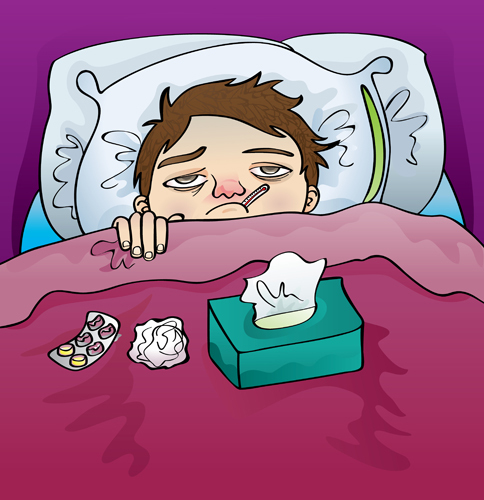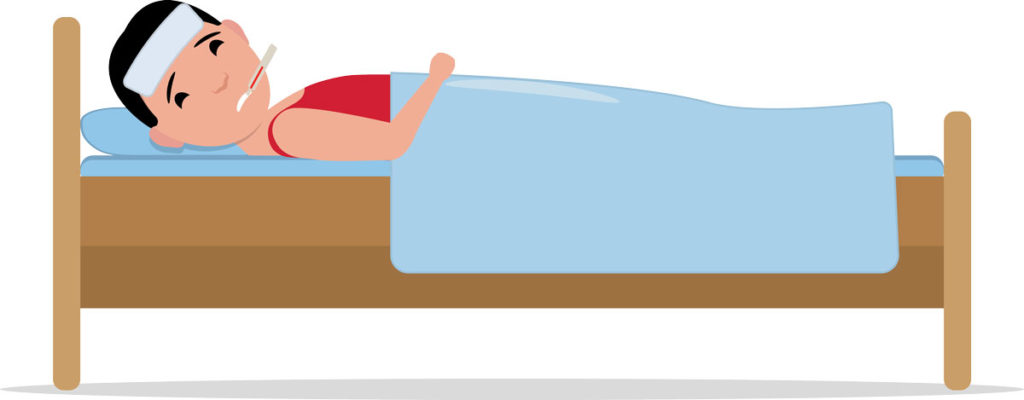
17 Jul Sick before the race? How to save your big day
Arrival of the Gremlin: Sick! Are you kidding me?
Your big day is tomorrow. It’s race time! Months and months of training are behind you. You’ve sacrificed countless hours with your friends and family to prepare. Countless sessions in the rain and cold, pre-dawn wake-ups, and skipped social events. You followed your coach’s training plan with discipline, not missing a single session. You also nailed your nutrition plan and did your best to get enough sleep.
And today, the day before the event, you woke up with a sore throat. Your nose is stuffy and your stomach is upset.
Your mind wastes no time plotting what will happen next. You’re sick!
It’s a cold, likely a bad cold, just like the one you had last year that put you out of commission for a week. It will only get worse throughout the day. You feel your head — seems hot. Here comes the fever!
What if it’s the Flu or Bronchitis? The would surely wreck your performance tomorrow. All that training time wasted! Finishing this event is the most important goal of the year. It represents your sense of purpose. And now it’s gone! All because of this stupid sickness!
The Gremlin has arrived and his mission is to unravel all of your hard work. Control the Gremlin or he’ll control you!
Creating a big story
You’re the author of your future–what story do you want now?
When it comes to sickness before big events, the tendency is to allow the mind to create a much bigger story than the physical reality. If you feed the narrative of sickness, you will give it wings and it will fly you into a state that will indeed wreck your performance.
The sicker you believe you are, the sicker you will be. If you feel sorry for yourself, your body will listen and will play the “sorry” role you’ve given it. If you make this moment a big story, you’ll have yourself a big story, one with an unhappy ending!
On the other hand, if you redirect the narrative, and focus your energy and thoughts elsewhere, you’ll kill the “sick” story before it reaches the press, and odds are you’ll be just fine in the race.
Maintaining perspective
In 20+ years in endurance sports, the number of mystery illnesses that I’ve observed arriving in the last couple of days before big events is significant. Yet, I can’t recall a single example of a failure to start or finish because of these surprise occurrences. In most cases, the issue was a non-factor during the events, some of which were Personal Best experiences for me and the athletes I’ve coached.
This isn’t to say that we are inventing our body’s response to food poisoning or the onset of an allergic reaction to a sudden spike in pollen. Many illnesses are beyond a stress reaction and will succeed in sidelining us completely, regardless of our mental strength and attitude. These “real” illnesses occur infrequently for most though, so my focus here is to help you turn around stress-induced illnesses related to normal pre-race anxiety.
Why are you sick? Understanding the most likely cause
What is happening here is the impact of a collision between pre-event anxiety (fear, uncertainty, doubt, excitement) and a physical body in a state of imbalance from the effects training and any taper or recovery you’ve offered it.
This is like taking a Formula 1 race car calibrated for a hot, dry track in the desert, placing it instantly on a cold, wet track in Belgium, and dropping in a distracted, foggy-eyed driver who is a little dizzy from taking sleeping medication to deal with a 9-time zone difference. It’s a recipe for things to go very wrong.
Face it, pre-race anxiety is normal, especially for events that you’ve attached significant meaning to. With a body that is already working hard to recover and to adapt to all the training you’ve given it, it’s all too common for the mind and body to protest by sending out a parade of cold symptoms at the worst possible timing. Don’t let this surprise you, and by all means, don’t give it power.
So, how do you know when it’s real or a mind game?
Cold Symptoms: For every situation that I’ve encountered where an endurance athlete had normal cold symptoms leading up to the start of an event, it was a non-factor during the event. Most of the time, the symptoms vanished soon after the starting gun fired. If you have a fever or infection, this is a different story and you should of course be careful and follow a doctor’s guidance.
Also, consider the potential for this illness to be an allergic reaction, especially if the symptoms arrived along with a change in your environment (in a location with a high pollen count, extreme changes in temperature or humidity, sleeping in a different place, with different bedding, etc.). If this is the case, remove allergens (if possible) and consider taking allergy medication.
If you have common cold symptoms right before a race, odds are it’s simply a stress reaction–a mind game. Tackle the stress situation first and distract yourself from giving the “cold” any attention. Even if the illness is more serious than a mind game, you will be well-served by the same practices to address the mind game situation, so you can’t go wrong addressing the mental side first. More on this in a bit.
Stomach Issues: The digestive system is extremely sensitive to stress. If your digestive system is reacting in protest in the days and hours before a race, look to stress as the most likely cause. Address the stress, and then if the issue is persisting up to the starting time, consider medication (like Imodium). Also, prepare for emergencies (carry extra TP) and hydrate sufficiently to replace fluids you’ve lost (I always carry oral rehydration salts when I race or travel). While it may make your race uncomfortable, if you’re prepared, you’ll get through it and the stress will vanish once you distract your mind by focusing on your the task of racing.
Actions to take when you detect a pre-race illness
Here’s how to redirect yourself and move your mind away from creating an even bigger illness story:
- Breathe 7s: Set a 7 minute count-down timer. Close your eyes and breathe deeply in and out through your nose. Take 7 seconds to inhale and 7 seconds to exhale.
- Play: do something that has nothing to do with your racing sport. Get out of your headspace and don’t take yourself, your sport or anything else too seriously for a while. Play mini golf or Frisbee. Join your kids or go solo on the playground slide a few times. Do a cannonball into the lake. Fly a drone, drive a go-cart, or simply skip some rocks across a pond.
- Complete a Concentration or Meditation practice: If you have a meditation practice, devote some extra time to it today. This is also a good moment for a yoga practice, especially Yin Yoga. If you have little to no experience with yoga or meditation, start with a concentration exercise to calm the mind. Then, complete a short “healthy you” visualization. For the concentration practice, set a 5 minute countdown timer and use the entire 5 minutes to take only two steps. Move your body AS SLOWLY as possible (micro movements) and as quietly as possible. After the timer goes off, sit down, close your eyes and create a mental image in your mind of yourself. Visualize your approach to the start line, your performance during the race and your smile as you cross the finish line. See a strong, healthy you, kicking ass the way you want to kick ass.
- Dive into Music: Play a musical instrument, whether you know how or not. If you have no musical talent, crank the tunes and bang on a bucket like it’s a drum! Dust off your old trombone or clarinet, strum a guitar, or just sing along to your favorite playlist. It doesn’t have to be concert-quality or even decent. Just have some fun doing one of the most primal practices there is! It will free your mind and also prevent it from giving time and energy to host Gremlin visits.
When it’s a real illness, deal with it
If you’ve done all of the above actions and the illness is persisting, try to wait as long as possible to make any decision on abandoning the race attempt. If at 2 hours before the start, you’ve got a fever or your system is too wrecked to keep fluids and food down, then you’re putting yourself at risk by racing. My guidance in this scenario is to withdraw and take care of yourself. Perhaps if many hours later, you’re feeling better, you can return to the race site to volunteer or simply cheer on the participants. There is healing power in supporting others. It will help get you out of an expected withdrawal-related funk. Most importantly, take the time you need to recover and enroll in another event as soon as possible.
Odds are, you’re fine and you’ll have a great race
Believe in yourself and the time you’ve invested into preparation. If you follow my suggestions, there is an excellent chance your “illness” will be a non-factor in the race. It’s an energy game, so get busy directing energy where you want it to go instead of allowing it to direct you. And for the next race, include race day sickness in your adversity preparation and you’ll be ahead of the game.
Be strong, and as a good friend of mine says, live wide open.
I wish you the best in your race!
— Coach Jeff
Jeff Grant is the author of Flow State Runner: Activate a Powerful Inner Coach’s Voice, Hill Running: Survive & Thrive, Run Faster: Unlock Your Speed in 8 Weeks, Running Heavy, and UltraRunning: Ultimate Guide. Based in Switzerland, Jeff is a coach and writer who specializes in mental coaching, peak performance, and transformation. He is also a Co-Founder of BridgeX Teams LLC, a global virtual team building company. Jeff’s popular newsletter is a digest containing inspirational and instructional resources, including his latest content. See recent issues and subscribe for free here. Refer to Jeff’s bio for more information, and please check out Jeff’s Coach & Author page on Facebook.



